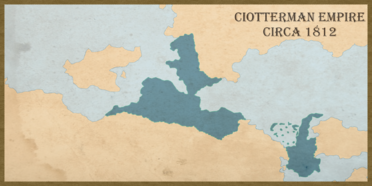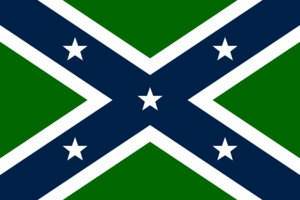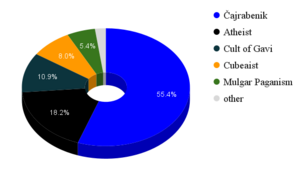Mulgaria
Mulgarian People's Republic | |
|---|---|
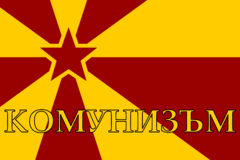 | |
| Ruler | Chairman Ivan Borisov (Contested) |
| Capital | Mŭdrostigrad |
| Government | Socialist People's Republic |
| Map of Mulgarian People's Republic | |
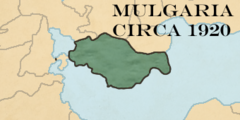 | |
Mulgaria, also known as the Mulgarian People's Republic, is a country in Meridia. It borders the United Duchies, Sylvania, and Tarantum in the east, Faru in the west, and Nepublia and Crosnia in the north. Its capital and third largest city is Mŭdrostigrad. Other population centers include its largest city Marbotyn and its second largest city Bŭrzavoda.
History
First Mulgarian Empire (508-1093)
Second Mulgarian Empire (1096-1703)
Grand Duchy of Mulgaria (1703-1878)
In the 1700s the Ciotterman Empire began expanding their invasion of Meridia into the declining Second Mulgarian Empire and by 1703 the title of the Grand Duchy of Mulgaria was created and awarded to a local noble family loyal to the Ciottermen. By the end of the decade, the Ciotterman Empire had conquered all of modern-day Mulgaria and the Second Mulgarian Empire had completely collapsed.
Throughout the 1700s the Ciottermen engaged in a process of “Oterrification” of the areas they had conquered up to this point. This process involved the creation of religious schools funded by the Church of Kermanish, a reward system for those who adhered to Ciotterman culture and Čajraism, and the establishment of Ciottermen communities within these areas with the objective of intermingling with the local population and spreading Ciotterman culture, language and religion. Whilst there was some Cubeaist influence in Mulgaria prior to the Ciotterman invasion, the duchy largely followed a number of Unorganized old Mulgar religions, the Ciotterman empire synthesized a lot of Mulgarian deities into Čajraism, this process facilitated Mulgarian conversion to Čajraism and by the latter half of the 16th century a majority of the Mulgarian population was Čajrabenik.
The reward system introduced by the Ciotterman Empire gave rise to a new social dynamic in Mulgaria. The Mulgarians who adopted the ways of the Ciottermen had all aspects of their lives facilitated and could be elevated to nobility or had otherwise prominent positions in society. Meanwhile, Mulgarians who resisted the process of Oterrification experience significant hardship and repression. This created a social dynamic wherein the Nobility and high status individuals of Mulgarian society developed a new culture separate from the rest of Mulgaria and much closer-aligned to the Ciottermen, whilst the peasantry and impoverished of Mulgaria had a culture more independent of the Ciotterman invaders that was, nevertheless, still affected by them. This social dynamic gave rise to the divergence between the languages of Common Mulgarian and Royal Mulgarian whilst also creating a cultural divide that still affects Mulgarians. It is important to note whilst there was intense resistance among the peasantry to the Ciotterman culture and language, Čajraism and aspects of the Ciotterman culture related to the sea were widely accepted.
The period of Ciotterman occupation of Mulgaria was largely a peaceful time, with Mulgaria being largely uninvolved in the wars waged by the Ciottermen. Only in the late 1800s would Mulgarians be conscripted to fight the Swopian empire, ultimately being defeated and signing the 1878 Treaty of Strand
Mulgarian Republic (1878-1916)
After the 1878 Treaty of Strand was signed between the Ciotarman Empire and the Swopian Empire, which provided a self-governing Mulgarian state, the Mulgarians formed a democratic republic founded on principles not unlike that of its fraternal republic of Areole. The Grand Duke of Mulgaria was heavily inspired by Areole's republican ideals and sought to create a similar republic that encompassed Areolean republicanism and Mulgarian high culture and aristocracy. The Duke himself got to keep his title, but it was legislated to be mostly ceremonial once the Republic had been established.
The Mulgarian Republic was a Unitarian Republic with a legislative, judicial, and executive branch. The executive branch was controlled by the President, who was elected by landed nobility. The legislative branch was known as the Mulgarian Senate, and their powers were limited to the writing and voting of laws. Senators of the Mulgarian Senate were also elected by landed nobility. The judicial branch was fully appointed by the Grand Duke of Mulgaria before the establishment of the Republic. Appointees of the judicial branch were appointed for life.
The first elected President was the old Grand Duke of Mulgaria, who served one term before resigning. A number of the Presidents to follow were members of the Royal Family, and the only dialect of Mulgarian allowed in government was Royal Mulgarian.
In 1887, universal suffrage was enacted in the Mulgarian Republic, leading to the largest shift in politics in the Republic's history. This led to the United Mulgarian Party losing 35% of its previously-full control of chairs to the new Justice and Freedom Party.
The United Mulgarian Party was the first party created in Mulgaria, and was the sole party in Mulgaria until 1887 with the creation of the Justice and Freedom Party. Additionally, by the 1890s, the Revival Party, the Mulgarian People's Party (later known as the Mulgarian People's Front), and the Organized Syndicates of Mulgaria were established. The UMP had won every presidential election in the Mulgarian Republic, but by 1908, the UMP was forced to coalition with the Justice and Freedom Party to retain a majority in the Senate.
Shortly before the Great Meridian War began, Rumen Radev was elected President of Mulgaria. As the Great Meridian War began to unfold, the Republic declared a state of national emergency, ceasing all elections indefinitely. This lent power to the Mulgarian People's Party, now known as the Mulgarian People's Front, who had been leading a guerrilla campaign against the government. As Mulgaria's losses mounted and their soldiers became disillusioned, hundreds of soldiers and generals alike flocked to the MPF. This led to the March of 1916, a coup by the MPF in order to secure control of the government.
Provisional Government of Mulgaria (1916-1920)

Following the 1916 coup, the orchestrators quickly organized to establish a provisional government to stabilize the nation and prevent a counter-revolution. After much deliberation within the Mulgarian People’s Front, it was ultimately decided that the Organized Syndicates of Mulgaria (OSM) were to be a part of the government, and so the government coalition was created. As a gesture of good faith, the Executive People’s Council was created as to allow further representation of the OSM in the executive. The rules for the Executive People’s Council were vague as it was only temporary. Ultimately it allowed the largest party, the MPF, 2 seats in the council and the second largest, the OSM, 1 seat.
Georgi Lukanov was the obvious choice for MPF representative, despite controversies regarding his militaristic stance, he had been a loyal and devoted member of the MPF since its inception, fighting many battles for the cause. Sonya Lyapcheva was initially a rather controversial pick, seeing as she was a woman and Mulgaria was still a rather conservative country, however, she demonstrated exceptional statecraft during her time in the council.
Stefan Filov initially seemed like a great choice for OSM representative, standing out for his willingness to combat the MPF when necessary, however, in 1917 it was discovered that Filov was related to the Grand Duke, which ultimately led to his replacement by Ivan Borisov. Borisov was a prominent Trade Unionist who played an important role during the 1916 coup by organizing a general strike during the period of the coup.
The Provisional Government was successful in bringing about a period of peace and stability, gaining popular support and, to some extent, mending relations with Mulgaria’s neighbours, however, it was decided by 1920 that it was time for the constitution to be written and for the Mulgarian People’s republic to be formally established
Mulgarian People's Republic (1920-present)
During the waning years of the Great Meridian War, the Mulgarian People's Front gained enough popular support and engaged in a coup of the Mulgarian Republic. With the liberal government overthrown, the communists quickly moved to establishing a socialist people's republic similar to that of the Swopian Union, but with a stronger focus on international socialism, an idea that had been all but abandoned in the Swopian Union for years.
It was by the fall of 1920 that the Mulgarian People's Republic had been formally established, with a constitution written to reflect such. One of the MPF representatives, Georgi Lukanov, stood out for his heroics during the civil war, and the party overwhelmingly chose to place him as their Chairman. This governmental change irreparably harmed relations with the Republic of Areole, as this change in government signaled for the MPR to leave the Great Meropian War and focus on building their own nation up.
Georgi Lukanov was a leader focused on developing Mulgaria's military, and, as a result, Mulgaria's relations worsened with nearly every nation except the Swopian Union. With excess funds looted from Mulgarian aristocrats, the government began funding revolutionary movements across the continent, narrowly avoiding an all-out war with the Republic of Areole.
Politics
The constitution of the People’s Republic of Mulgaria (colloquially known as the People’s Constitution) was adopted in 1920. The constitution established the position of the Chairman as the supreme executive of the Republic, declared the Mulgarian People’s Assembly the supreme legislative and judicial body, and Established Mulgaria as a People’s Republic.
Other notable constitutional provisions are as follows, the establishment of the Mulgarian People’s Republic as a unitarian government, guaranteed equality for all citizens, and defined common Mulgarian as the official language of Mulgaria
The Mulgarian People’s Front (MPF) has been the leading party since the 1916 coup, maintaining a supermajority coalition with the Organized Syndicates of Mulgaria (OSM). Other Minor parties have historically been a part of the Assembly, such as the Revival Party, the Agrarian Democratic Party, and the Conservative Party, however, none have managed to hold more than 5% of the Assembly’s seats
The coalition between the MPF and the OSM was established before 1916 as a means of gaining popular support among the Trade unionists for the coup. The relation between the OSM and MPF outlines the government dynamic of Mulgaria, with the OSM believing in a more liberal approach to governing and supporting increased control of Trade unions over the economy whilst the MPF is a strong supporter of State control over the economy and a more repressive approach towards governing
The most notable compromise between the MPF and the OSM was the establishment of the People’s Executive Council (derogatorily known as the Council of 3) during the provisional government. There was a major blow to MPF and OSM relations when their controversial pick for representative in the council, Stefan Filov, was discovered to be related to the last Grand Duke of Mulgaria. This was remedied by their immediate replacement and ousting from the OSM.
As of September 1924, all parties outside the Government’s coalition have been banned.
Government
The Ultimate Legislative and Judicial body of the People’s Republic of Mulgaria is the Mulgarian People’s Assembly, Elections for the assembly are held every 5 years. Members of the Assembly are given the right to Propose and vote for bills and all bills that meet the voting requirements and do not infringe upon the Mulgarian constitution, which is decided by a constitutional committee, are adopted as law. As an ultimate recourse in legal cases that were not settled by lower courts, the Assembly votes upon the outcome of the case.
The assembly also elects a Speaker of the Assembly who is in charge of determining the order in which bills and motions are voted on. There is also a constitutional provision for a motion of no-confidence to be called against the Speaker of the Assembly or the Chairman, should such a bill be seconded by at least 5% of members of the assembly, it must be immediately discussed and voted on in the next meeting of the Assembly
The Supreme Executive position is called the Chairman. A Chairman may propose bills, command the military, conduct diplomatic meetings, declare war, pass decrees, declare a state of emergency, among other powers. A Chairman’s term is for life except for extraordinary cases. Some cases in which a Chairman’s terms may be cut short are resignation, a vote of no-confidence by the Assembly, a revocation by the people or no longer being part of a political party.
A vote for revocation of the Chairman is begun if a petition for revocation has the signatures equivalent to 20% of the population, at which point, a popular vote for the revocation is held
The election of the Chairman is done through popular vote, any Mulgarian citizen may participate as long as they follow a set of criteria such as being over 18 years old, being members of a legally recognized political party, and having no criminal record of treason or murder.
Administrative Divisions
Foreign Relations
Despite their shared ideology, throughout most of Mulgaria’s history, they maintained diplomatic neutrality regarding the Swopian Union. All members of the executive branch in Mulgaria since the coup, including Lukanov, have been vocal about their belief in Mulgarian diplomatic independence. Lukanov’s recent attempts to pursue closer diplomatic relations with Swopia are heavily criticized, even within the government.
Ever since the 1916 coup Mulgaria’s relations with nearly every nation, Swopia being the most notable exception, deteriorated significantly. Particularly with their previous closest ally, the Republic of Areole, tensions nearly broke out into a war, and whilst war was narrowly avoided, tensions are still high between both Nations.
Military
Economy
Demographics
Religion
The Mulgarian People’s Republic is officially an atheist state, however, a large section of the population are Čajrabenik. Čajrabenik population in mulgaria is divided into two major churches, the church of Kermanish and the followers of Poseitune. Most of Mulgaria’s religious makeup is a legacy of the Ciotterman occupation, with a few Cubeaists and Old Mulgar religions from prior to the period existing in a less prominent manner. Ever since the coup of 1916, atheism has been on the rise in Mulgaria, being the second most common denomination following Čajrabenik. The Cult of Gavi is a branch of Čajraism that, despite attempts at repression throughout history, is relatively prominent in Mulgaria.
Despite repeated attempts in the modern times to turn the Čajrabenik into atheists by the Mulgarian government, the religion has largely resisted these attempts. The Mulgarian government, however, still found relative success in turning Mulgar pagans and Cubeaists towards atheism.
Culture and Language
<insert culture here>
The official language of Mulgaria, as of 1920, is Mulgarian, with the Common Mulgarian dialect being the most popular. However, the languages spoken in the territory now known as Mulgaria have shifted dramatically throughout the years. The first instances of a unified "Mulgarian language" originated during the Ciotarman Empire years.


